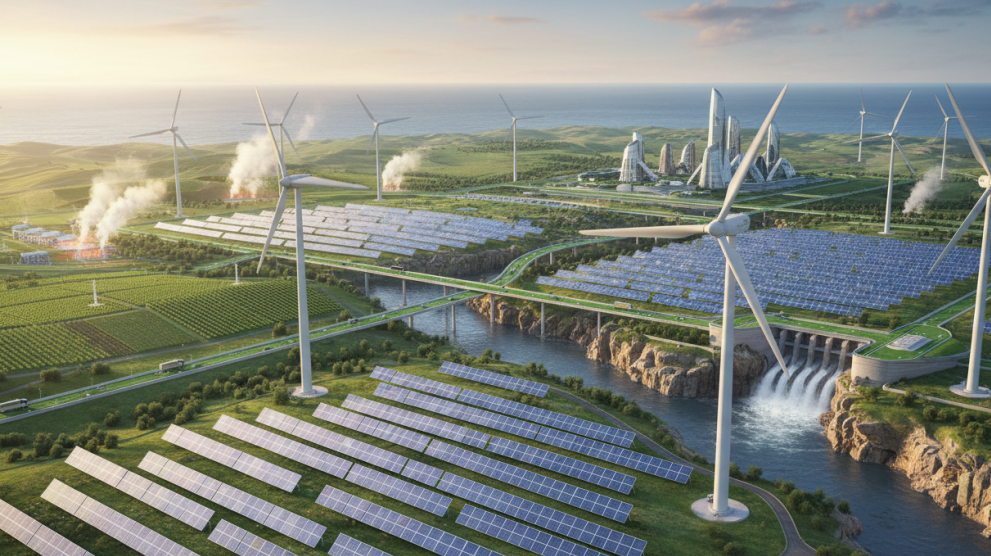Iranian sailors recovering in Sri Lankan hospital after U.S. submarine attack
Iranian sailors who survived a U.S. submarine strike in the Indian Ocean were recovering at a hospita...

Azerbaijan is stepping up its renewable energy ambitions with plans to develop eight new solar and wind plants by 2027, backed by $2.8 billion in investment and aimed at exceeding its 2030 climate targets ahead of schedule.
Azerbaijan is rapidly expanding its renewable energy sector as part of a national strategy to boost green electricity production, enhance energy security and reduce emissions in line with its Paris Agreement commitments. The government aims to generate at least 30% of its electricity from renewable sources by 2030, but new projections suggest the country could reach 33% by 2027.
Between January and November 2024, Azerbaijan’s green electricity output rose by 80% year-on-year, according to government figures. Eight new utility-scale wind and solar power plants, with a combined capacity of 2 GW, are expected to be completed by 2027. These facilities are projected to produce 5.3 billion kilowatt-hours of electricity annually, save 1.2 billion cubic metres of natural gas, and cut greenhouse gas emissions by up to 2.5 million tonnes.
Much of the investment is coming from international partners. In October 2023, the Qaradag Solar Power Plant — a 230 MW project developed by UAE-based Masdar — became the first major renewable facility in Azerbaijan built via a public–private partnership. The plant is expected to generate 500 million kWh annually, save 110 million cubic metres of gas, and reduce carbon emissions by 200,000 tonnes.
Meanwhile, a 240 MW wind power plant under construction in the Khizi–Absheron region by Saudi Arabia’s ACWA Power is due to become operational in 2025. The plant is forecast to produce 1 billion kWh of electricity per year and cut carbon emissions by 400,000 tonnes.
In partnership with BP and Masdar, Azerbaijan is also building the Shafag–Jabrayil Solar Power Plant in Jabrayil. The 240 MW plant is expected to supply 500 million kWh annually and reduce emissions by up to 330,000 tonnes.
These projects are part of a wider plan to transform Azerbaijan’s liberated territories, such as Karabakh and Eastern Zangezur, into “Green Energy Zones.” A 2021 presidential decree established the zones to promote sustainable reconstruction and position the country as a regional clean energy hub.
On the international front, Azerbaijan says it's leading efforts to export green electricity to Europe. The “Green Energy Corridor” — a 1,000+ km undersea cable project across the Black Sea — will link Azerbaijan’s power grid to Georgia, Romania and Hungary. The joint venture overseeing the corridor was established in 2024, with the European Commission pledging €2.3 billion (about $2.5 billion) in funding.
Officials say the corridor could significantly bolster the European Union’s energy diversification efforts while helping Azerbaijan achieve its 2030 renewable energy targets ahead of schedule.
The legal framework underpinning these developments includes the 2021 Law on the Use of Renewable Energy Sources and strategic documents such as the “Azerbaijan 2030” policy and the 2022–2026 Socio-Economic Development Strategy.
By attracting major foreign investors and implementing advanced Independent Power Producer models, Azerbaijan is positioning itself as a reliable partner and an emerging leader in renewable energy across the South Caucasus.
U.S. President Donald Trump said the U.S. military has enough stockpiled weapons to fight wars "forever"; in a social media post late on Monday. The remarks came hours before conflict in Iran and the Middle East entered its fourth day.
U.S. first lady, Melania Trump chaired a UN Security Council meeting on children and education in conflict on Monday (2 March), a move criticised by Iran as hypocritical following U.S. and Israeli strikes that triggered a UN warning about risks to children.
A torpedo from a U.S. submarine sunk an Iranian warship off the coast of Sri Lanka, U.S. Secretary of Defense, Pete Hegseth told reporters as the Iranian conflcit entered its fifth day on Wednesday.
The U.S. embassy in Riyadh was hit by two drones resulting in a limited fire and some material damage, the kingdom's defence ministry said in a post on X on Tuesday, citing an initial assessment.
Shahid Motahari Sub-Speciality Hospital in northern Tehran and parts of the Golestan Palace were bombed on day two of the U.S.‑Israel strikes. AnewZ Touraj Shiralilou is in Iran's capital city and said that the facility was flattened in an airstrike.
The death toll from heavy rains and flooding in Brazil’s Minas Gerais state has risen to 46, authorities said, with 21 people still reported missing. The storms triggered landslides and widespread flooding, displacing thousands across Juiz de Fora and Uba.
The administration of U.S. President Donald Trump on Thursday (12 February) announced the repeal of a scientific finding that greenhouse gas emissions endanger human health, and eliminated federal tailpipe emissions standards for cars and trucks.
Tropical Cyclone Gezani has killed at least 31 people and left four others missing after tearing through eastern Madagascar, the government said on Wednesday, with the island nation’s second-largest city bearing the brunt of the destruction.
Rivers and reservoirs across Spain and Portugal were on the verge of overflowing on Wednesday as a new weather front pounded the Iberian peninsula, compounding damage from last week's Storm Kristin.
Morocco has evacuated more than 100,000 people from four provinces after heavy rainfall triggered flash floods across several northern regions, the Interior Ministry said on Wednesday.
You can download the AnewZ application from Play Store and the App Store.

What is your opinion on this topic?
Leave the first comment